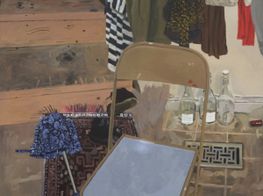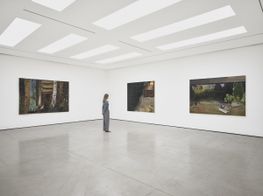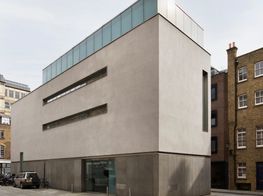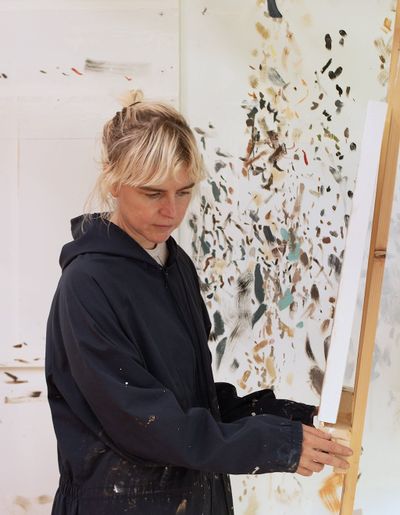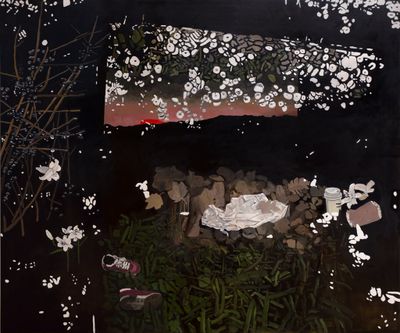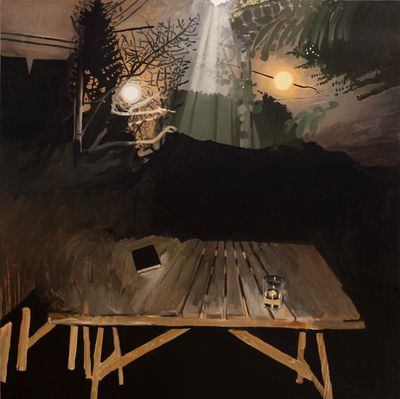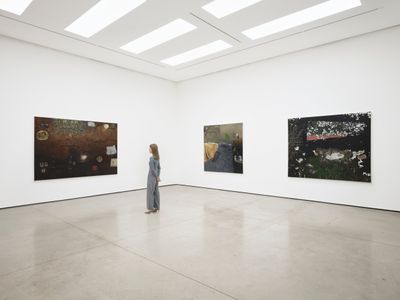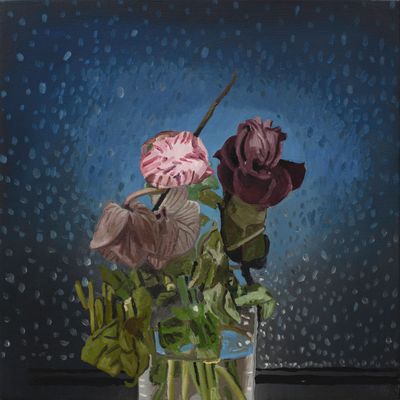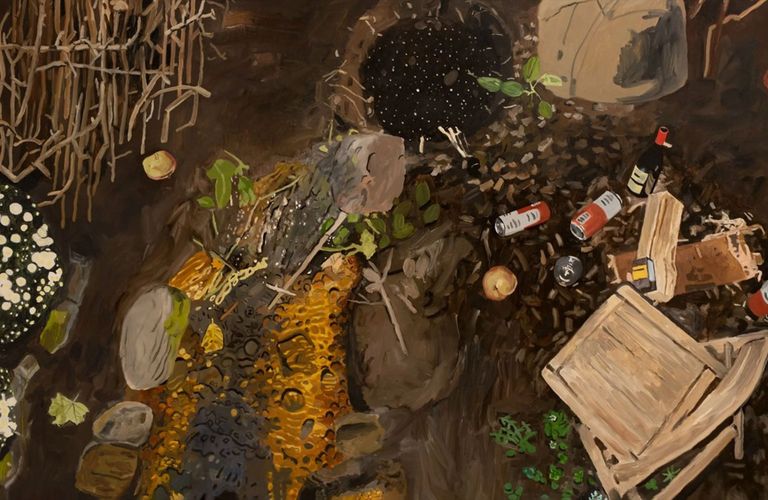
Margaux Williamson in the Studio
On the November morning that I visited Margaux Williamson at her studio in Toronto, it was cold enough that raindrops were becoming snowflakes in mid-air. By evening, the ground was covered in a blanket of snow for the first time this year.
Williamson paints in the garage-turned-studio behind her house. The walls were bare that day, except for the places where she'd wiped her brush while working on the paintings that had been shipped off for her solo exhibition at White Cube in Hong Kong (18 November 2022–7 January 2023). Earlier that morning, the artist had been on a video call with the gallery as they installed the work.
Williamson's large-scale oil paintings are of—to put it simply—the things immediately around her. She paints quotidian scenes like tablescapes, the fire pit in her yard, the darkened interior of local bars, and rooms in her house. But the scenes aren't that straightforward. Representation is tangled in the paintings, space and perspective are unfixed, and narrative appears only to disappear. The paintings look like the dreams you can only half-remember in the moments after waking.
Born in Pittsburgh, Williamson has lived and worked in Toronto since 2000. She's known for her collaborations within the creative community, including with her friend Sheila Heti, whose 2010 novel How Should a Person Be? tells a fictionalised version of the two women's friendship. In 2014, Williamson published a book-as-exhibition titled I Could See Everything, which comprised paintings made for a fictional exhibition at an imaginary museum.
The 14 large-scale paintings and four small works in the exhibition at White Cube were all made this year. Like much of her recent work, they contain no figures but look as though someone may have just fled the scene. In all of them, the glow from various light sources spills into shadowy spaces. In Fire and Bookshelf (2022), flames and embers cast orange light onto nearby forms, while near the top of the canvas titled Moon (2022), three luminous spheres could be either lunar or street lamps. Water, which is a common motif in her work, shows up as spouting fountains, droplets on a window, or glinting reflections in a glass.
In reading about your practice, like the catalogue for your 2021 exhibition Interiors at the McMichael Canadian Art Collection, and your 2014 book I Could See Everything, it's interesting to discover how writers discuss your work. While the quality of light, colour and brushstrokes are so distinctly yours, the contents of the paintings can't easily be described.
I'm always curious about how people are seeing things. If I saw that people were trying to figure out the space in a painting, I realised I'd made the transitions too smooth. I don't want to paint actual spaces, and it took a little bit of time to reconcile that. I don't want to show anything convincing. I'm more interested in seeing or untangling than I am in imagination or world-building. It's not that I want to invent anything; I feel more faithfulness to pushing against the edge of the limits and virtues of painting.
How do your paintings unfold?
I don't plan them. Maybe I know I'm going to paint a table, but that's all. I put one thing down and then I'll put the next thing down. I do one thing at a time and let it resolve itself. There's still a lot of surprise and pleasure in discovering what it's going to be.
You've said that you've been writing a lot lately. How did that start?
I was working through a project that felt like pulling teeth, and a friend suggested I write through it. So I did, and suddenly I had 40,000 words. I didn't really understand how much intuition was involved in writing. I thought it was more like drawing—you know what you're doing and then you execute it. But you write and then at the end it's as surprising as painting is.
You generally paint alone, but sometimes you work with other people in the room.
Actually, I'm pretty good at working with people if there's no talking. I find that energy really interesting. Sheila [Heti] and I used to work together in the same room. And even if we irritated each other, by the end we'd be almost euphoric. With another person around, it feels like you're working on something bigger than yourself. It's relaxing, right? To not have to think about yourself. Some people find that company also helps with meditation, but I still meditate better alone.
Do you find painting meditative?
Yes. I just came back from three weeks at the MacDowell residency in New Hampshire. One night while I was there, people were sitting around playing music, and the playwright Jasmine Lee-Jones was talking about remembering to take a breath before she sings. Just a pause to remember where she is, who she is and why she's singing. I realised that's what painting feels like: the breath before you sing.
Then what's the singing?
I don't know. Something else. I don't sing [laughs]. Anyway, at least for me that's what painting feels like, maybe because I've done it all my life. That's why painting is so wonderful. It's nourishment to me.
What does painting feel like for you? Is it pleasurable?
I think pleasure plays a big part. The reason I have any skill is because of practise, and I practised because of pleasure. Painting was always an escape for me; it was a vacation. But of course, I'm such a worker and I want that vacation to be hard-won. If it wasn't for desiring to be there, I probably wouldn't have been good at it. You need patience and time, and you need to really be present to learn something.
How about writing?
At first, I felt shame about writing; I just assumed I wasn't a writer because I didn't write. But then I couldn't stop doing it. I was in an empty studio and everyone was asking how my painting was going, and I'd say 'fine', but I couldn't stop writing. I don't know why I kept it a secret. I think I like secrets.
Do you think there are secrets in your paintings?
I think they're all a secret. I think they're all something you can hold onto.
This week, I've been thinking about painting so much that when I look at an object or light falling on my bathroom tile, I can't help but think about how I'd mix certain colours to represent that. Do you find that when you've been in the studio for a while, you look at things as though you're going to paint them?
Absolutely. Once a day I suddenly get stuck looking at something, in a sort of non-thinking state where I'm really seeing. When I first started working on the works for this show, I didn't know if I had anything else to paint. I thought I'd painted everything. But by the end I was just staring at the ground outside. I started examining everything. I was so in the zone that I felt like an athlete and I was like—wait, I think I'm really starting to see.
When I was really focused on learning a new language, I'd look around and think about how I'd describe the things I saw in the new dialect. It was like a constant inner monologue of translation.
That's exactly right. Painting is a language. You start thinking in paint and you start dreaming in paint. It changes things. When you really see something, instead of seeing the clichés of it or the symbology of it or what we understand it to be, you begin to realise that what we actually see is really strange. It's interesting to take that stuff away and to not reduce, but, to understand that it's maybe not what we think it is.
You've said you've learned to get out of your own way while painting. What do you mean by that?
I think the hardest job in painting is learning to respect your brushstroke, no matter what. I had to learn to respect them and not to constantly correct them or judge them. Trusting that this is the best I can do—this is what my brushstrokes look like. Respecting that is kind of like respecting the world. Getting out of my own way is about not thinking that I know better than my hands.
If it's your hands that are in charge, how do you know when a painting is done?
I get a special feeling [laughs].—[O]
Main image: Margaux Williamson, Stream (2022) (detail). Oil on canvas. 160 x 228.6 cm. Courtesy © Margaux Williamson and White Cube.

